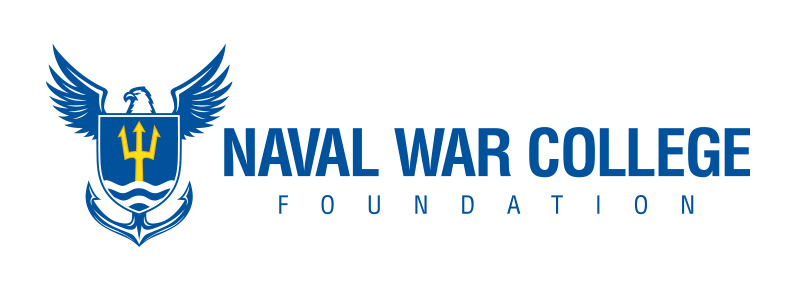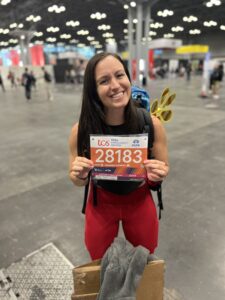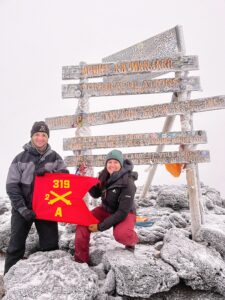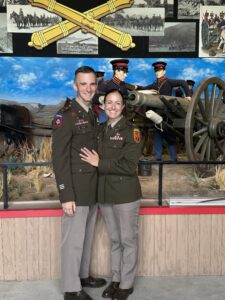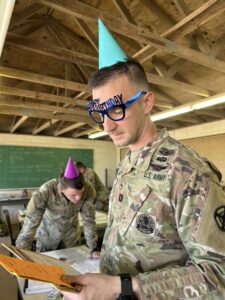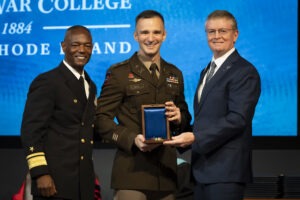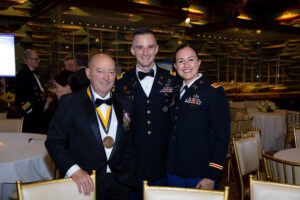This article originally appeared in the Winter 2024/2025 edition of The Bridge magazine.
MAJ Destry “Sam” Balch, USA, and MAJ Sara Roger, USA, were a rare couple accepted as students to the U.S. Naval War College (USNWC) for the 10-month in-residence program in 2023. With 10 and 11 years of service respectively, the Texas natives graduated in November 2024 and have moved on to their next assignment in Germany. Balch graduated from the College of Naval Command and Staff (CNCS), where he participated in the Halsey Alfa Advanced Research Program. He was recognized as the President’s Honor Graduate for the CNCS. Roger, also a graduate of the CNCS, was a member of the Holloway Advanced Research Program. As members of the Foundation, they attended the November 2024 Sentinel of the Sea Award Gala as student representatives. Read on to learn more about their journey to the USNWC and the impact the experience has had on their personal and professional development.
What inspired you to join the military?
Sara Roger: As an only child, I was raised by my mother, a single parent who proudly served in the Army for 20 years. Watching her navigate her enlisted career, I witnessed firsthand the joy and fulfillment she found in serving her country. She always strived to improve herself physically, mentally, and spiritually and maintains that lifestyle to this day. The Army provided the foundation for her lifestyle, shaping her into the remarkable person she is today. Seeing her dedication and resilience inspired me to follow in my hero’s footsteps and pursue a career in the Army. My mom encouraged me to aim high and ensured I received a college education, which led me to attend the United States Military Academy, graduating with the Class of 2013. Her support and example have been instrumental in my journey, and I am proud to carry forward her legacy of service and commitment to excellence. Joining the military was not just a career choice for me; it was a way to honor my mother’s influence and to embody the values she instilled in me. Go Army, Beat Navy!
Sam Balch: Although I was only in fifth grade, September 11th, 2001 had a profound impact on the psyche of my small Texas town. During my formative teen years, particularly during the surge in Iraq and Afghanistan, there was a noticeable shift in my community toward encouraging civil service. I knew I wanted to attend college, but I also felt a strong calling to serve. I joined the Texas A&M University Corps of Cadets, where I fell in love with the discipline, mission, and camaraderie of military life. This experience solidified my decision to commit my life to service, and I ultimately commissioned as an Army officer in 2013.
Serving as an Army officer, particularly alongside my wife, has been the greatest honor of my life. Witnessing the dedication of Soldiers, Sailors, Airmen, Marines, and Guardians to their service inspires me daily to strive to be the best leader I can be in service to our nation. I’ve been in the Army for over ten years, and each year I fall more in love with my branch, and the people who serve in it.
How did you come to the USNWC?
SR: My journey to the USNWC began with a discussion about professional timelines with a mentor of mine and my husband’s. As we reviewed my career path, the topic of the Command and General Staff College came up. Although I was aware of professional military education opportunities with sister services, I hadn’t considered them seriously. However, my mentor strongly encouraged us to apply to the USNWC, emphasizing that it was the best year of his Army career. He wasn’t the first Army officer to share such high praise, which piqued our interest. We decided to take his advice and apply, and we were thrilled to be accepted together. Our time at the USNWC was transformative, not only for our professional development but also for our personal lives. The experience strengthened our marriage, deepened our understanding of our profession, and enhanced our connection with our joint brothers and sisters from other services. The diverse perspectives and collaborative environment at the USNWC enriched our learning and prepared us for future challenges in our military careers. We are grateful for the opportunity to be part of this esteemed institution and to grow both individually and as a couple.
SB: Our senior mentor attended about 10 years ago. Intrigued, we asked other mentors about their experiences, and we found that many of the senior Army officers we admired were graduates. The common denominator of all the leaders we looked up to was their time spent in Newport, RI. They all praised it as the best year of their lives. Encouraged by these testimonials, we spoke to our detailer and confirmed that we could both attend simultaneously. This confirmation, coupled with the glowing reviews and the unique opportunities offered convinced us that the USNWC was the perfect choice for our professional development.
How do you think your experience at the USNWC will influence your future as a leader?
SR: My experience at the USNWC has profoundly shaped my development in two key areas: effective communication and critical thinking. While the projects, assignments, and wargames have undoubtedly refined my tactical and operational skill set, it is my enhanced ability to communicate across cultures and approach problems with a critical mindset that will most influence my future leadership. The diverse learning environment has allowed me to practice and improve my communication skills, ensuring I can convey ideas and strategies effectively to a wide range of audiences. Moreover, the emphasis on critical thinking has taught me to apply my knowledge thoughtfully and innovatively to complex problems. I am confident these skills will have lasting impacts on my leadership style, enabling me to lead more effectively in diverse and challenging situations.
SB: My time at the USNWC has equipped me with a comprehensive set of Army leadership tools. The most valuable skill I’ve gained is the ability to properly frame a problem and develop effective strategies to address it. The methods and tools we learn here are relevant at the national policy or strategic level and adaptable to the tactical and technical levels of warfare. This ability to think critically and solve problems will significantly enhance my leadership effectiveness.
How did your time at the USNWC change or reinforce your views on military strategy and leadership?
SR: My time at the USNWC significantly enhanced my understanding of military strategy and leadership, particularly in the context of civil-military (civ-mil) relations. As a junior and company-grade leader, my grasp of these concepts was limited, and I didn’t fully appreciate how our military functions within the international rules-based order. Through insightful discussions with my moderators, seminar classmates, and the friends I made here, I gained a deeper understanding of the symbiotic relationship between the military and civilian sectors. This newfound knowledge has helped me see how these dynamics impact the units I serve with at every echelon. My experience at the USNWC not only broadened my perspective on civ-mil relations but also reinforced the importance of strategic leadership in fostering effective collaboration and maintaining global stability.
SB: My time at the USNWC transformed my understanding of what defines an effective strategic leader. I’ve learned that successful strategic leaders don’t just operate at the strategic level; they also can translate and anticipate how tactical and operational events can influence strategic and political outcomes. This expanded perspective on the interconnectedness of various levels of warfare has deepened my appreciation for the complexity of strategic leadership.
What opportunities did you have to interact with students or faculty from other branches of the military or allied nations, and how did that impact your learning?
SR: One of the most enriching aspects of my time at the USNWC was the opportunity to interact with students and faculty from different branches of the military and allied nations. Learning to communicate effectively in a joint and multi-national environment has been a highlight of my experience. As an Army officer, I realized that my approach to thinking, processing information, and communicating has been shaped by a decade of experience within a specific organizational culture. This became evident as I worked to convey my thoughts to my joint and allied classmates, each bringing their unique perspectives and communication styles. Navigating these differences required growth and adaptability, teaching me how organizational culture influences large institutions such as military services and sub-services. This experience deepened my appreciation for our sister services, allies, and partners. The diverse viewpoints and collaborative spirit within the USNWC community broadened my understanding and prepared me to work effectively with multinational partners and allies in my next assignment in EUCOM. I am confident that these experiences will be invaluable as I engage in future joint and multinational operations, enhancing my ability to contribute to complex strategic endeavors.
SB: As an Army officer, I often found myself in the minority within my seminar groups and the Halsey Alfa Advanced Research Program. As the “Army Guy,” I learned the importance of effectively translating and communicating the Army’s missions and capabilities to the joint force. This often involves actively considering and adjusting my lexicon to better engage with my peers. For instance, a “constraint” has a very different meaning in the Army planning process than in Naval or Joint planning processes. I had the privilege of discussing and proposing solutions to exceptionally complex problems alongside subject matter experts from every branch of the military and allied nations. These interactions broadened my perspective, deepened my understanding of joint operations, and enhanced my ability to collaborate across different military cultures.
What motivated you to join the Naval War College Foundation (NWCF)?
SR: I was inspired to join the NWCF by friends who were already members and consistently praised the value and benefits of being part of this prestigious community. Their experiences highlighted the strong support and resources the Foundation provides, which enrich the educational and professional development opportunities available at the USNWC. Additionally, witnessing the Foundation’s significant contributions to the College’s activities and initiatives motivated me to become a contributing member. I wanted to play a part in sustaining and enhancing the quality of education and research that the USNWC offers. By joining the Foundation, I aim to support the College’s mission and be part of a network that is dedicated to advancing strategic thinking and leadership in national and international security.
SB: My experience at the USNWC has been immensely positive, developmental, and life-changing. While I will undoubtedly champion the USNWC within the Army’s operational force, supporting the mission and message of the NWCF allows me to contribute on a scale far beyond what any individual alumnus could achieve. The Foundation is pivotal in promoting and advocating for the USNWC, and I am motivated to be part of that vital effort.
What would you like to say to fellow students or alumni about the benefits of Foundation membership?
SR: This is a community of like-minded individuals who value their time at the USNWC. As Foundation members, we have the unique opportunity to engage with a network of professionals who are committed to lifelong learning and leadership in the field of defense. This membership offers access to exclusive events, lectures, and resources that enhance our understanding of strategic issues and broaden our perspectives. We look forward to proudly representing the USNWC as we return to the operational force. Your continued support and engagement are crucial in maintaining the rich legacy of excellence and innovation that the USNWC is known for. Let’s continue to uphold the values and standards that have been the hallmark of our institution, and together, make a positive impact in our respective fields.
SB: A Foundation membership allows us to contribute to an institution that provides critical resources, organizes impactful events, and fosters public outreach—all essential elements we, as students and alums, benefit from and often take for granted. Your support ensures the continuation of symposiums, events, and initiatives that enhance our professional development and strengthen our community.
- While at the USNWC, MAJ Roger completed the New York City Marathon in November 2023.
- For their honeymoon, MAJ Balch and MAJ Roger climbed Mount Kilimanjaro, Tanzania in October 2023.
- Both Balch and Roger were promoted to the rank of major at Fort Sill, Oklahoma in June 2023. Fort Sill is the home of the U.S. Army Field Artillery and the Fires Center of Excellence.
- MAJ Balch was an instructor at the U.S. Army Field Artillery School from 2022-2023. His students surprised him with a small birthday party while training live fire cannon artillery in May 2022.
- RADM Darryl L. Walker, USN, President of the USNWC, MAJ Balch, USA, and CAPT E. George Lang, Jr., USN (Ret.) at the November 2024 graduation. Photo by Kristopher Burris.
- ADM James G. Stavridis, USN (Ret.), MAJ Balch, USA, and MAJ Roger, USA at the 2024 Sentinel of the Sea Award Gala. Photo courtesy of Hechler Photographers.
